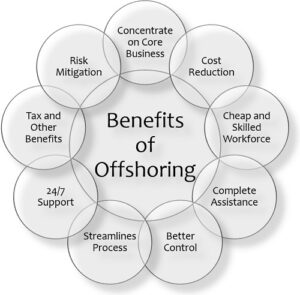
Offshoring Pros And Cons
Outsourcing vs. Offshoring
The terms “outsourcing” and “offshoring” are usually used interchangeably, although they are quite different concepts. In this article, we will get a closer look at what do these different two terms are, and what are the pros and cons of offshoring and how it can affect your business.
But, before talking about offshoring, let’s simplify the meaning of outsourcing.
What is Outsourcing?
Outsourcing simply means hiring and using a third party company to improve your product or promote your service for you. You can outsource locally, it doesn’t have to be abroad or a foreign company. Outsourcing can be with a company or individuals.
So, what does Offshoring mean?
What is Offshoring?
Offshoring has become one of the most reliable and profitable businesses. However, Offshoring can have its pros and cons to your business, know more about the advantages and disadvantages of offshoring to see if it is right for you. But first, let’s discuss what does offshoring means, keep on reading to know more.

Definition of Offshoring
Offshoring is hiring an abroad or outside company to carry out some of your business tasks. Offshoring doesn’t usually mean “the third party” it can be carried out by your company but not in the same country, it can either be production offshoring or services offshoring.
What is the difference between Production Offshoring and Services Offshoring?
Production offshoring is the relocating of the physical manufacturing processes to another country.
On the other hand, services offshoring is the relocation of the company’s administrative and technical services like accounting and finance, human resources, sales services, and software development.
As a business owner, if you want to go globally you have to ask yourself first why you need offshoring? And what are the advantages that you will get from offshoring? If there are any disadvantages what are they? How can offshoring help your business?
In the next few lines, we will try to make your decision much easier and give you some of the pros and the cons of offshoring to make up your mind and choose what is best for you and your business.

Pros Of Offshoring
The benefits of offshoring
1- Reducing Labor Cost
One of the most beneficial advantages of offshoring is reducing the labor cost. Any business owner is looking for profit-boosting, and offshoring serves as a great benefit for that.
Usually hiring offshoring employees is much less expensive than hiring employees from the same country especially if you are offshoring in a developing country you can have more employees with less salaries.

2- Reducing Operational Cost
Aside from salary saving, offshoring can help you save other types of compensation and benefits.
These other savings can include health insurance, social security benefits, workers’ compensation.

3- Opening Up In New markets
Offshoring will help you have more opportunities to be known in foreign markets and have a new platform for your business to grow in.
3- Skilled Labor
Having a wide range of skilled labor and well-trained employees is one of the major benefits of offshoring. Having high standard employees will ensure that you have a high level of service.

4- Handling mundane tasks and risks
Hiring an offshoring company can help you with the most difficult tasks like staff management, which will save you both time and money and reduce your labor cost.

5- 24/7 operations
Hiring a foreign company to handle some of your tasks, can make your business ongiong24/7 due to the different time zone.
This can be a disadvantage and an advantage for your business.
It can benefit your business as you can turn over some of the unfinished tasks to the offshoring team. This will help you save tie and finish your tasks as soon as possible.

Disadvantages Of Offshoring
1- Communication issues
Communication issues are one of the most drawbacks of offshoring.
Communication issues may include language barriers and social barriers.
Language barriers
Most of the offshoring counties use English as an official language and as a first language, although English is an official language in many countries, different accents and the depth of using it may differ from one country to another.
Social and Culture Barriers
Hiring an offshoring company can be a little challenging, due to the different cutter and social barriers.
There are some concepts that should be respected while hiring an offshoring company to show your customer respect.

2- Quality control problems
You may give a detailed brief of what you want your product to look like and how it should be handled by the offshoring company, but handling that closely can be a little hard.
This quality control issue is due to different reasons such as the working culture, langue barriers, and supply chains of the country.

3- Time zone differences
As mentioned above time zone difference can be a double-edged weapon; it can be an advantage and disadvantage.
Time zone difference needed to adjust so you can have a full communication with the offshoring company if you face a problem or want to adjust something with your product or your service.
It can be challenging for the management in both countries to organize shift patterns that are not disruptive for both sides.
Offshoring can have both advantages and disadvantages, some of the advantages can be useful and can improve your workflow like reducing the labor cost, having a great base of skilled laborers and employees, and having your work being handled 24/7.
On the other hand, its disadvantages can be hard to handle like language and social barriers, or a lack of communication f lack of quality.
Thinking about both the pros and cons of offshoring and balancing between both of them can be a great benefit to your business.
Keep in mind the previous pros and cons and you will make the best decision for you and your business.


